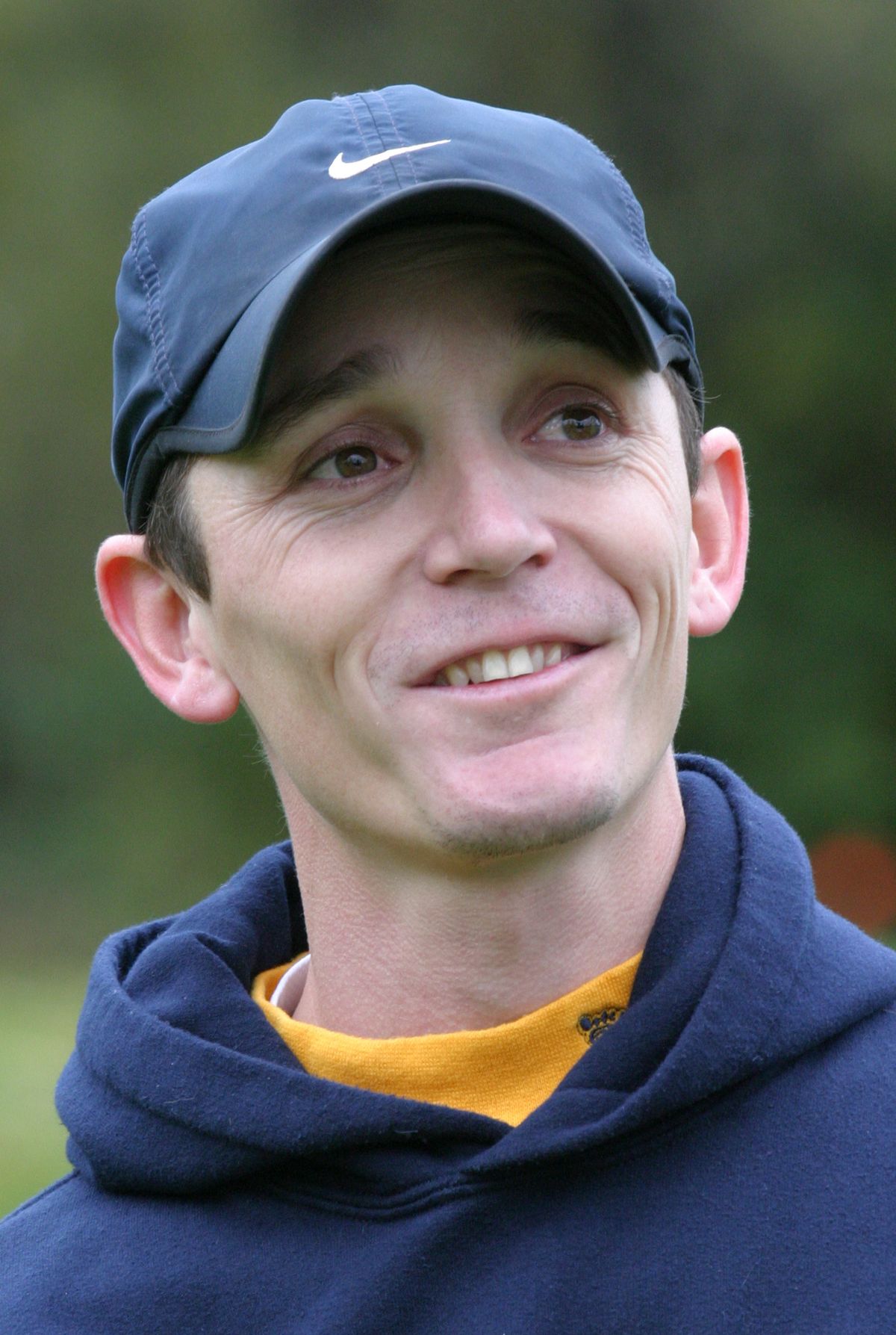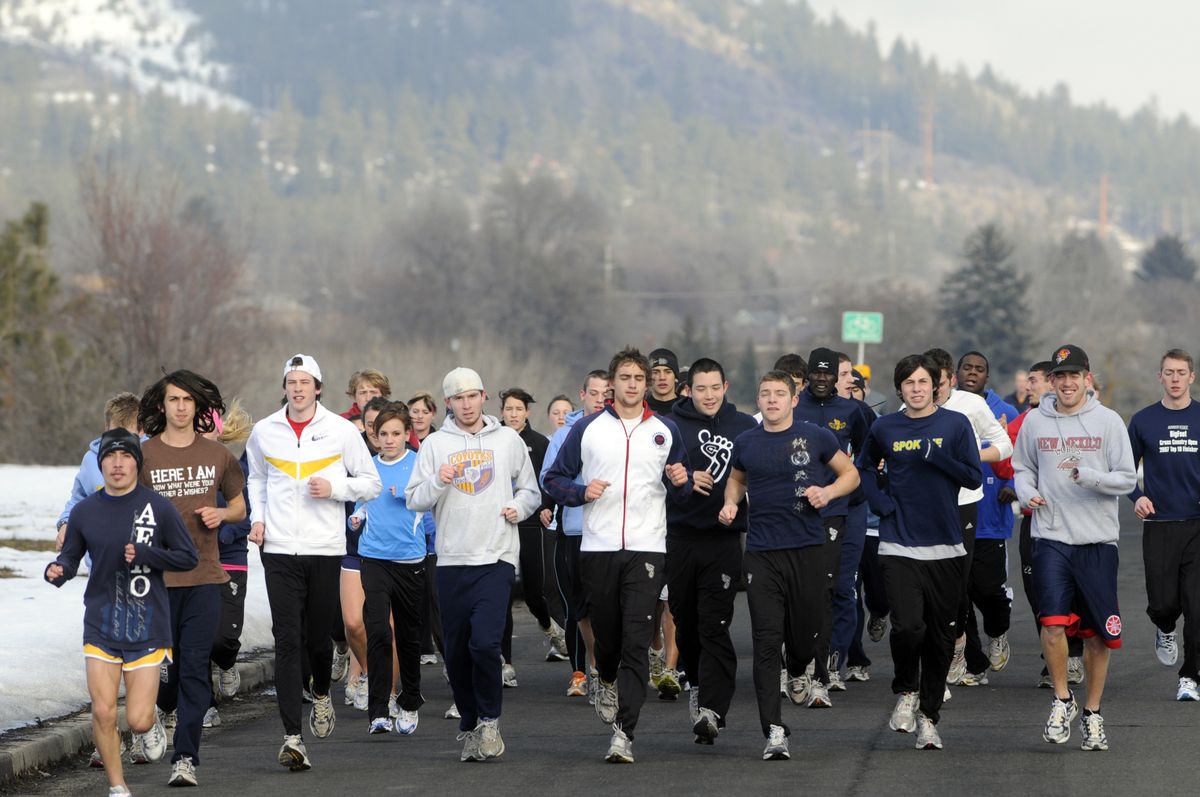Stepping out in memory of mentor
Anderson (Courtesy Photo / The Spokesman-Review)
They arrived three and four at a time, dressed for a February run – more stocking caps than shorts, although there were shorts – and clustered in a dark passage by the swimming pool.
Down another hallway not 50 feet away, the door to Erik Anderson’s office was open and a slice of warm light escaped. But no one lingered there; no one even glanced in that direction.
“We used to always go back and sit outside his office, waiting for these runs,” said Herschel Sanchey, a freshman distance runner at the Community Colleges of Spokane. “But we’re all avoiding that. It’s too hard. It’s hard enough just thinking about it.”
But there was nothing else to think. They were runners and their coach – their friend, their confidant, their inspiration and, yes, their taskmaster when necessary – had died the day before in a horrible and tragic accident. Teaching a bowling class in the student activities center on the Spokane Community College campus, Anderson had been trying to free a stuck pin when the pinsetter engaged and broke his neck, killing him instantly. The news spread quickly and the shock followed, most intensely among the 38-year-old coach’s extended family – the runners he attracted to CCS and the close-knit coaching staff of the Sasquatch track program.
“Thirty eight,” said his close friend Larry Beatty, the CCS head track coach, “and we’re never going to see him again.”
So they gathered Friday to feel a little less alone, and in the middle of the afternoon they set out the back door of the Johnson Sports Center on a run, trusting that the memory of Erik Anderson’s infectious smile and spirit would tow them along.
Down the fire lane to Ermina, a hard right onto South Riverton and under the Greene Street Bridge in an unruly formation along the Spokane River. CCS runners, track teammates, alumni, coaches – joined by Anderson’s wife, Mariza.
More than 40 of them in all, not a few holding back tears.
“I’m glad it’s such a big crowd,” said Larsen Agee, a sophomore from Spokane. “I couldn’t go out and do this alone.”
An unusual sentiment for a distance runner, by reputation the most solitary of athletes, but these were circumstances well beyond the usual. Besides, the best coaches always make running a cause and a cause needs company – and Anderson was surely among the best of coaches.
And not only because of his record, though it was exemplary – cross country championships every year since he’d returned to head the CCS program in 2004.
Championships are easily enough won if you can assemble superior ability and keep it healthy and motivated. There’s a little more to it at the community college level, where maybe the ability isn’t so superior or the spirit must be rebuilt or there’s a job that must be juggled with classes and workouts. Sometimes it’s not about recruiting, but repair and retention.
“I wasn’t even going to run out of high school,” said Agee, a West Valley graduate. “I didn’t think I’d make a very good collegiate runner. But he called me and called me and called me and wouldn’t take ‘no’ for an answer. He believed in me before I believed in myself.”
In this sort of mission, he may have been repaying a debt.
Anderson was a high school runner in Vancouver, soured by a bad experience with a coach. He joined the Army, and later joked that his dad had steered him toward the infantry by saying, “It’s an extra 500 bucks a month and we haven’t been to war in 20 years” – only to wind up in Desert Storm. After his return, Beatty – then coaching at Clark College – pulled him out of a pickup game and talked him into turning out for cross country.
“I needed a fifth guy,” Beatty said, “and he ended up being my first. He was the little giant.”
An elfin 5-foot-4, Anderson was larger than life to his runners, not necessarily for turning them into champions but for finding, reclaiming and sticking with them – and running was only a part of the equation. Sanchey noted that he came to CCS “only to win titles, but Erik taught me to make sure you set the building blocks for your life here.” Justin Culver, a self-proclaimed “head case” from Port Orchard, Wash., had false starts at multiple colleges – including CCS – before returning here last fall.
“I feel kind of guilty – Erik and I had a falling out my freshman year here, but he didn’t give up on me,” he said. “Man, he just had this smile that made you feel like a million dollars when you saw him.”
And his loss can feel bankrupting.
“God always takes the best people, takes them away from the people who need them,” said Dak Riek. “Erik was my father, my mother. What do I have left?”
Riek escaped from violence-torn Sudan in 2000, making his way to Washington four years later. His mother died when he was 10; his father remains in Sudan. He bounced among three foster families on the West Side and attended three high schools. He came to Spokane a gifted but raw talent, in all respects, and Anderson made him a special project – prodding him in his schoolwork, redshirting him to give him an extra year to earn his associate’s degree, counseling, cajoling. On Friday, he imagined what Anderson might be telling him now.
“When I was sleeping last night, I could see him talking to me,” Riek said. “He was saying, ‘Take care of yourself. Take care of business.’ He wanted me to be a success. He wanted me to come back someday and say, ‘I did it. I graduated from a university.’ So I want to be able to do that.”
And then he turned and headed out the door with his friends and teammates, the first steps in carrying on.

